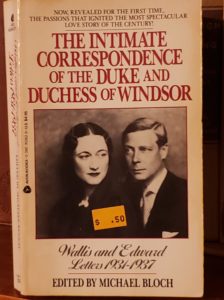
About a month ago I made a deep search through my reading piles that sit on a bookcase in my bedroom closet. I added a fair number of books to this pile some years ago and have been slowly reading those books. So having finished another book, I went there to see if one on the shelves would be suitable for my next read.
I found the book The Intimate Correspondence of the Duke and Duchess of Windsor. The subtitle is, I guess, Wallis and Edward Letters 1931-1937. I say “I guess” because the layout of the cover is strange, and it’s not clear to me that this is the subtitle. I picked this book up at a thrift store many years ago. Now, I’m not a big fan of the British monarchy and their whole system of nobility, but I love letters. That’s why I bought the book.
I won’t go into much of the history. Some people know it, some don’t. Edward was heir to the throne of England. Somehow he met Wallis Simpson, an American woman living in England. The were frequently together in social situations. The crown prince became enamored by her and, even though she was married (after a prior divorce), Edward ditched his girlfriend for her. Even though he was 37 when he met Wallis, Edward wasn’t ready to marry.
The letters in the book are mixed with a considerable amount of commentary. I was surprised that most of the letters weren’t between Wallis and Edward but between Wallis and her Aunt Bessie. They are interesting letters, tracing the development of the prince and her meeting, then getting to know one another, then becoming dependent on one another. The letters between Edward and Wallis begin only after several years of their relationship. And, they are not intimate in the sense we think of today. They don’t give salacious details of secret rendezvouses and trysts. They mainly consist of cute little things like “oh wasn’t that a great dinner party last night, my love?” As the relationship grew, the letters were more and more how he couldn’t live without her, how she loved him, but that it was all so futile.
Two things came out clearly to me from the letters, mainly the prince’s. He was terribly immature. Raised by governesses and tutors, with little involvement from his parents, Edward sounds like an 8th grade schoolboy as he writes to Wallis. All he knows are parties and pubs. Oh, he had duties, I realize, but they are rarely mentioned. Edward had regular, somewhat small parties at his country home and rarely interacted with his family. Wallis became more and more estranged from her husband, who was also a friend of the prince. Eventually Mr. Simpson has an affair with her good friend, giving her grounds for divorce.
Just in time, too, because Edward’s dad dies and he becomes king on Jan 20, 1936. And here the second thing that came out clearly begins. Naturally, all Britain wanted the king to marry, be happy, give them a queen, and hopefully produce an heir. But the king wants to marry a soon to be twice-divorced woman—an American to boot—and parliament won’t allow it. It was around September 1936 that the existence of Mrs. Simpson comes to the awareness of the British public. The prince has already been discussing this with the prime minister. He says Edward can’t marry Wallis. She will never be queen. If he does marry her, the entire cabinet will resign. Parliament will never agree to grant her any royal title. And this is what is so bizarre to me. The ministers and parliament—the government—have to approve who the head of state marries? That’s absolutely absurd, and it’s one of the reasons I think monarchy is ridiculous. Edward decides he can’t be king unless Wallis is by his side. See how immature he is? He gives up his throne and must leave the country in disgrace and exile.
But I prate, and have moved away from the book. While the letters were not quite what I thought they would be when I paid 50¢ for the book at a thrift store, I found it all captivating. It’s history, whether the persons involved are attractive to me or not. I found myself able to read many pages a day and rarely skipped anything. Yes, the commentary was more than I’m used to in a collection of letters, but it was not too much. I think the editor, Michael Bloch, got it about right.
I give this book 4-stars. Sorry, but I can’t give one about British royalty a full 5. But is it a keeper? I have a nice collection of letters, a number of which I started but few which I finished. The answer is no, it is not a keeper. I don’t see myself ever reading this again. So out to the donation pile it goes. Or I’ll sell it or give it away if one of my readers (you know who you are) wants it.
Why not keep it to have a broader collection of letters? That’s a good question, but ultimately why do I need to keep a collection of collected (or selected) letters? I don’t. They would be one more thing for my heirs to have to deal with when I’m gone. No, Edward and Wallis go out to the garage. I hope to recover the 50¢ for them, but will gladly see them go without recovering my investment. They were worth that price for sure.